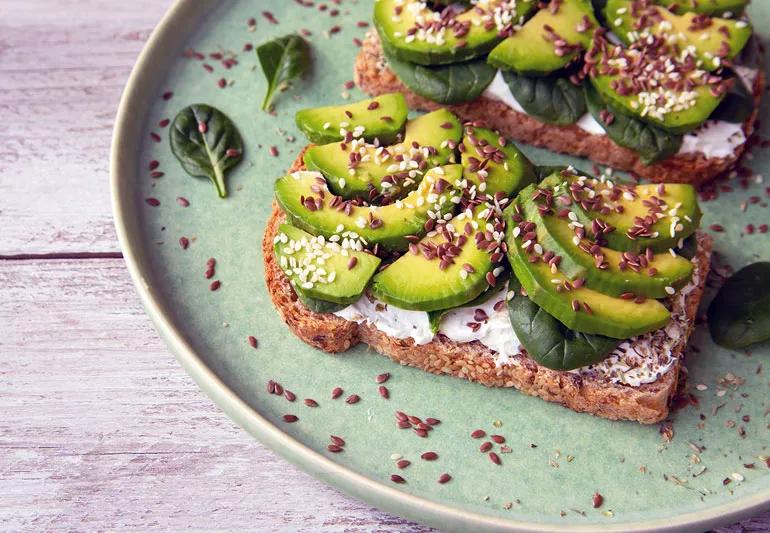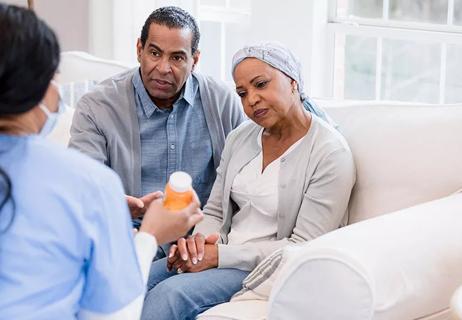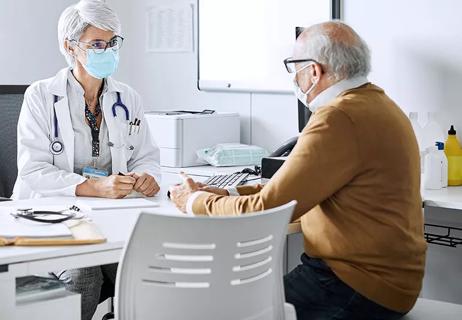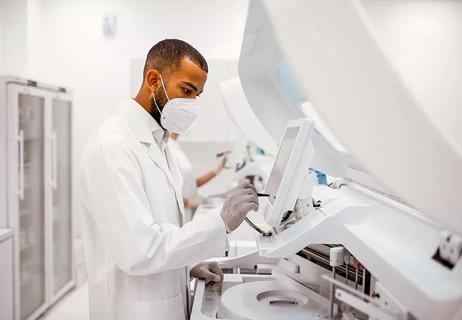A decreased appetite can cause weight loss, so opt for smaller meals and full-fat foods

As you’re going through your cholangiocarcinoma (or bile duct cancer) treatment, you may have noticed a decrease in your appetite.
Advertisement
Cleveland Clinic is a non-profit academic medical center. Advertising on our site helps support our mission. We do not endorse non-Cleveland Clinic products or services. Policy
“The cancer site itself can sometimes cause a decrease in appetite,” says registered dietitian Nickie Kaetzel, MS, RDN, LD. “But if you’re going through active treatment, whether it’s chemotherapy or radiation, a lot of times, that can cause decreased appetite as a side effect.”
And a decreased appetite can often lead to weight loss.
“That’s also going to lead to muscle loss and increased risk of malnutrition,” says Kaetzel. “Then, it’s almost like a domino effect because then, that muscle loss can lead to increased fatigue and weakness. And then you’re feeling more tired and generally rundown.”
So, how can your diet help?
Kaetzel shares what foods to eat, as well as some tips for how to stay healthy while going through bile duct cancer treatment.
Bile is a fluid that helps your body digest food. Your bile ducts are narrow tubes that transport bile from your liver and gallbladder to your small intestine.
“Your bile helps break down the fat in the foods that we eat,” explains Kaetzel. “So, that’s an important mechanism because if we’re not digesting and appropriately breaking down and absorbing the fat that we eat, then we’re essentially not utilizing those calories either. So, that, in turn, can lead to weight loss.”
Advertisement
While going through cancer treatment, it’s important to keep your diet filled with good-for-you foods that contain vitamins and minerals. Lean proteins are also key. Kaetzel suggests the following:
“Focus on eating a healthful, balanced diet,” says Kaetzel. “Then, that can be adjusted and changed as needed depending on what other potential side effects from treatment you might be having.”
Those with bile duct cancer should avoid or limit high-fat greasy foods like bacon, sausage, pepperoni, salami and hot dogs.
“You could have more abdominal pain by eating those foods,” warns Kaetzel. “And if your bile duct is blocked or even partially blocked, your bile is not getting through to help break down the fat in these foods.”
You may also experience nausea or vomiting while going through bile duct cancer treatment.
Kaetzel suggests eating bland, lower-fiber foods like white bread, white rice, low-fiber cereal and canned vegetables for a short time to help ease any side effects.
She also cautions that you may also experience constipation. “In those cases, increase fluids and fiber intakes. There might be some over-the-counter medication that your doctor may suggest as well.”
You may not feel hungry or are too tired to eat as you go through your bile duct cancer treatment. Kaetzel says to keep these tips in mind.
“It’s always important to make sure that you’re drinking enough water and fluids and paying attention to the types of fluids that you’re drinking,” she says.
And if you’re going through chemotherapy, you want to watch how many caffeinated beverages you’re having each day.
“It’s certainly fine if you still need your morning cup of coffee, just not a good idea to be drinking caffeinated coffees, teas or sodas all day long because they can dehydrate you.”
“Especially if a patient is having that decreased appetite or lack of desire to eat, I would suggest smaller, frequent meals and snacks versus the traditional three large meals a day,” says Kaetzel.
If you stick to three larger meals a day, you may not eat enough during each meal to meet your calorie or protein needs.
Don’t think this is a free pass to gobble up those high-fat greasy foods we mentioned above. (We’re sorry!)
Opt for foods like whole milk, whole-fat yogurt, cheese, cottage cheese, nuts and seeds.
“To avoid losing weight and prevent malnutrition, you need those higher-calorie, higher-fat foods,” says Kaetzel. “It’s important to know the difference between why your body may be able to tolerate something like whole milk or whole-fat yogurt versus fried foods.”
Advertisement
If you’re receiving treatment for bile duct cancer, it’s not recommended that you start any vitamin or mineral supplements.
“Sometimes, those supplements can be contraindicatory to certain chemotherapy drugs,” notes Kaetzel.
If you’re already taking vitamin and mineral supplements, it’s a good idea to have a pharmacist review your list.
“They can determine which ones should be stopped and which ones should continue,” she says.
This will vary from person to person, but your doctor may suggest you start adding protein shakes or powders to your daily routine.
“If someone’s appetite is poor, protein shakes can help ensure that somebody is getting enough calories and protein to preserve that lean muscle mass and hopes to prevent malnutrition or prevent further worsening malnutrition,” says Kaetzel.
Thinking about your diet can be overwhelming, especially when you’re coming to terms with a cancer diagnosis. Working with a dietitian during this time can help ensure you’re making the best choices for your body — and help take the guesswork out of it.
A dietitian can consider your medical history, your routine and any food allergies or preferences when creating a meal plan.
“Dietitians are your nutrition experts. We can look at your specific scenario with how your cancer is affecting you and your nutrition,” says Kaetzel. “We can come up with an individualized nutrition plan that meets your needs. That will help make sure you’re preserving your muscle mass, lowering the risk of malnutrition, and ultimately helping your body tolerate your treatment better.”
Advertisement
Learn more about our editorial process.
Advertisement

You may experience fatigue, weight loss, nausea and diarrhea, but exercise and medication can help

There are many options, including surgery or medication

Biomarker testing tells doctors how to target their treatments

Rely on trusted information from hospital systems, medical nonprofits or your oncologist

Thoughts and feelings can change over time; relaxation, self-care and support groups can help

Olive oil is high in heart-friendly unsaturated fats

The tropical fruit is a good source of antioxidants and vitamin C

Alternating between periods of eating and fasting may benefit your health

Wearing a scarf, adjusting your outdoor activities and following your asthma treatment plan can help limit breathing problems

Your diet in the weeks, days and hours ahead of your race can power you to the finish line

When someone guilt trips you, they’re using emotionally manipulative behavior to try to get you to act a certain way